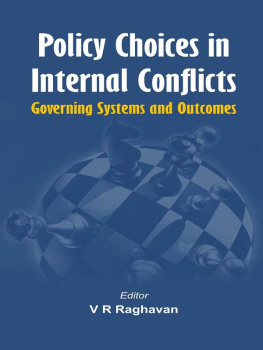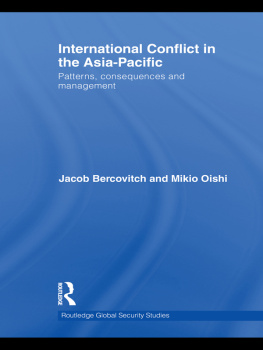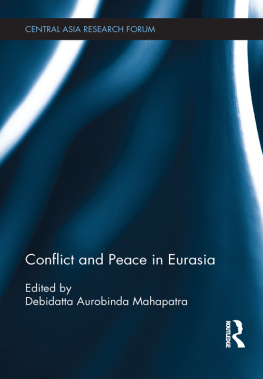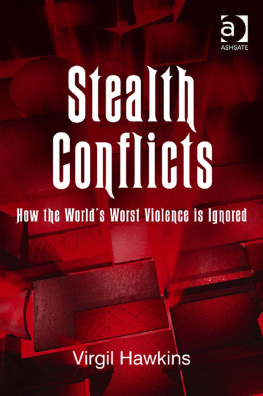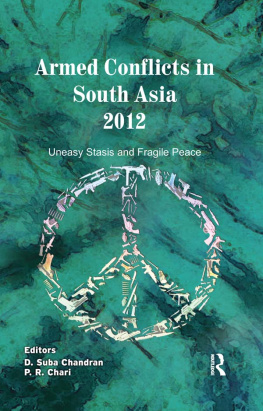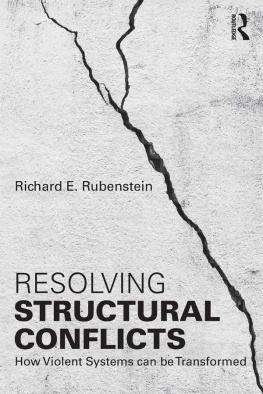Policy Choices in Internal Conflicts
Governing Systems and Outcomes
Policy Choices in Internal Conflicts
Governing Systems and Outcomes
Editor
V.R. Raghavan
Published for
Centre for Security Analysis
Chennai, India
Vij Books India Pvt Ltd
New Delhi (India)
E book published by
Vij Multimedia
A division of Vij Books India Pvt Ltd
2/19, Ansari Road, Darya Ganj
New Delhi - 110002
Phones: 91-11-65449971, 91-11- 43596460
Fax: 91-11-47340674
e-mail :
web : www.vijbooks.com
2013, Centre for Security Analysis, Chennai, India
Centre for Security Analysis
9-B Ninth Floor,
Chesney Nilgiri, 71, Ethiraj Salai,
Egmore, Chennai-600008
Tamil Nadu, India
+91-44-65291889
www.csa-chennai.org
All rights reserved. No part of this publication may be reproduced, utilized in any form or by any means, electronic or mechanical, including photocopying, recording or by any information storage or retrieval system, without permission in writing from the publisher.
The views and opinions presented in this book are of the author(s) of the chapters in the book and not necessarily that of the Centre for Security Analysis, Chennai, India.
First Published : 2013
This book is meant for educational and learning purposes, the author(s) of the book has/have taken all reasonable care to ensure that the contents of the book do not violate any existing copyright or other intellectual property rights of any person in any manner whatsoever. In the event the author(s) has/have been unable to track any source and if any copyright has been inadvertently infringed, please notify the publisher in writing for the corrective action.
Acknowledgement
The Centre for Security Analysis (CSA) has undertaken a three year research project Internal Conflicts and Transnational Consequences supported by the John D and Catherine T MacArthur Foundation. This volume is part of the ongoing project and its publication has been possible by the project grant.
Foreword
The Project on Internal Conflicts & Transnational Consequences was conceptualised as an innovative exploration of the situation in four different states, each with its long history of internal conflicts. The four states of India, Nepal, Myanmar and Sri Lanka had over decades faced a situation in which ethnic groups seeking a different political disposition had challenged the state with armed uprisings. The decades long conflicts had led to creating stake holders in the conflicts who were driven more by the consequences of the conflicts than by the original causes of the conflicts. This reversal of the cause conflict outcome model to conflict consequences continuing conflict offered a new, potentially rich and policy relevant area for analysis. The four states chosen faced the same kind of challenge armed rebellion but were governed by different governing systems. India is a democracy, Nepal was a monarchy, Myanmar was governed by a military Junta and Sri Lankas democracy was a democracy substantially skewed in favour of and dominated by a Buddhist polity.
The project was conducted over three years in four countries. It involved-about 100 scholars with political, social, economic, and military backgrounds. During the process, CSA collaborated with seven think tanks from the four countries thus enriching the study with their expertise. The project produced eleven books which were reviewed in many newspapers and journals. The list of books is in the Appendix.
The conflict management or conflict resolution approaches used by the four states reveal insights into how such challenges can be met in future. Internal conflicts are endemic in most newly independent and developing states. Dealing with them not only requires an understanding of the major causes of conflicts but also anticipating the problems which can lead to the conflict continuing after it is formally ended. India, Nepal, Myanmar and Sri Lanka have all experienced conflicts which continue in one form or another even after the peaceful or military termination of conflicts.
Post conflict scenarios depend in great measure on the approaches used by the state during the conflict. Generally there are four approaches used by all states. The first is the security approach in which police or armed police are used to contain conflict. Second is the military approach in which the military might is utilised under, either with legal backing or without to eliminate or defeat the insurgents. Third, economic or development plans are used to offset the grievance of parties who have taken up arms. Last, a political accommodation of the demands of conflicting groups is sought. Quite often states have used multiple approaches simultaneously in varying intensity to find an end to the conflict. Given the reality of such conflicts mostly based on identity related causes, states need to address the challenge through accommodation with and amidst multicultural, multi-ethnic and multi-religious contexts.
Long running internal conflicts also impact on the economy and foreign relations of the states which are unable to find an end to internal conflicts. In other words, internal conflicts have serious external consequences. A states legitimacy to rule, its accountability to international regimes, and its image as stable or weak entity comes under review, which in turn places the state and its leaders under pressures which contribute to the continuance of conflict. The use of military force to subdue or defeat the internal conflict is often seen as a quick solution to the problem. However, the continued use of military force over long periods creates its own dynamic of international opprobrium, human rights excesses, permanent alienation of population with the state, and the long term collateral damage of pitting the military against the population.
Involving the military in dealing with internal conflicts places immense pressures on the military hierarchy. The military in internal conflicts faces the trilemma never being able to simultaneously achieve force protection, of being able to distinguish clearly between combatants and non combatants in the populace and the physical elimination of insurgents. The paradox of sub optimal operational choices creates adverse consequences for both the military and the political leadership.
A state must deal with internal conflicts within a legal frame work of its constitution. The legal dimensions of such measures and experience of the four states made in this volume provides a significant study. Maritime aspects of internal security in states with coastal geographies are another facet which has been examined in this collection of papers.
This volume, the last in the range of perceptive volumes, brings together the lessons, policy choices and options available to states dealing with internal conflicts. It also lists strategic and operational errors of judgments made by states. This volume will offer many insights based on the strategies adopted by the four conflict ridden states over decades. The readers in political, military, economic, foreign policy domains as well as the academia will find this volume of considerable value.
V. R. Raghavan
Lt. Gen. (Retd)
President
Centre for Security Analysis
Overview
K Srinivasan
There had not been many inter-state wars after World War II, a few exceptions being Arab-Israeli wars, Indo-Pakistan wars, Indo-China war, China-Vietnam war, the Korean war and the Falkland war. This is a comparative statement. While this study confines itself to internal conflicts in India, Myanmar, Nepal and Sri Lanka, there have been and are many internal wars going on in Afghanistan, Bangladesh, Pakistan and elsewhere in Southeast Asia, Africa and South America. The inter-state wars have been short. Of course they have caused immense harm to the economy and well-being of the concerned states. Nonetheless, such wars have also acted as catalyst to better internal cohesion and enhanced the national fervour and in some cases have contributed to the development in subsequent phases of respective nations life. What have done more damage to the developing countries are the internal conflicts generally known as small wars. These small wars have been endemic to the developing countries and have become long drawn out wars. They have divided the societies, caused untold damage to the economy, institutions, governance and polity. Their consequences have been far reaching.

